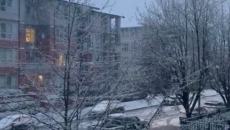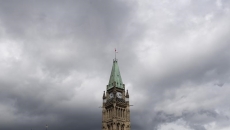TORONTO - When Linsey Marr boarded a bus in Lake Louise, Alta., earlier this week, she was floored to find out that she had to take off her N95 respirator and put on a medical mask for the ride.
The Virginia Tech engineering professor, who studies viruses in the air, said the policy defies scientific reason, because respirators offer far more protection than a medical mask, both to the wearer and others around them.
"It would be like asking someone to take off their seatbelt, and to use this piece of rope to tie themselves to the seat instead," Marr said by phone.
A number of Canadians responded to her tweet about the incident saying they'd run into similar resistance while wearing respirators at hospitals and other health-care settings.
As the rise of the Omicron variant upends Canada's COVID-19 response, experts say medical mask mandates should not only be abolished, but wearing respirators should become the norm.
"It's even more critical now to protect yourself and others that we wear high performance masks, which means they filter out particles well, and they fit well."
Both medical masks and respirators are made out of materials that can filter out particles of all sizes, said Marr. The main difference comes down to fit — respirators are designed to form a seal around the face, while medical masks often leave gaps under the cheeks or chin that allow very small particles to seep through.
These leaks lead to significantly less protection against the novel coronavirus, she said. A well-fitted respirator offers more than 95 per cent protection, she said. For medical masks, effectiveness ranges from 20 per cent to 90 per cent depending on how snug it is.
If hospitals or other facilities want to standardize what masks people wear because of concerns about quality control and counterfeits, Marr offered a simple solution: either let people wear a medical mask under their respirators, or offer everyone a N95.
On Friday, Ontario's chief medical officer of health issued an interim guidance requiring that all medical workers wear N95s when providing direct care to possible or confirmed COVID-19 patients.
Under the previous directive, health workers were allowed to wear medical masks unless it was determined that there was an elevated risk of infection, such as during procedures that generate small airborne viral particles.
The move was in line with Public Health Ontario's revised recommendations on personal protective equipment for health workers, which recognize N95s as an acceptable alternative to medical masks under certain circumstances, including for people visiting patient rooms and long-term care homes.
The agency said in an email that evidence published before the emergence of Omicron did not support the use of N95s over medical masks to protect health workers against COVID-19. But until more is known about the new variant, "it is prudent to enhance all layers of protection," the agency said.
The Public Health Agency of Canada also updated its mask recommendations in November amid growing consensus that small airborne particles play a significant role in spreading the novel coronavirus, in a departure from previous messaging pointing to larger respiratory droplets as the main mode of transmission.
The guidelines endorse the use of respirators among the general public, noting that they may provide a better fit than medical or non-medical masks.
Colin Furness, a University of Toronto infection control epidemiologist, said health authorities need to go further to encourage the use of N95 respirators across indoor public settings.
This campaign should include efforts to help Canadians identify the type of respirator that best fits their face, he said, likening the process to trying on the right pair of jeans.
"That's public education we desperately need," he said. "The fact that people are on their own for this is a travesty."
Mask messaging needs to reflect our evolving understanding of the novel coronavirus, said Furness.
Medical masks are effective at trapping droplets before they spread to others, he said. But as the Omicron variant has underscored the threat of airborne transmission, Furness said the emphasis needs to be on promoting respirators as a means of self-protection.
"You need to wear a mask defensively," he said. "N95s are the tool for the job."






